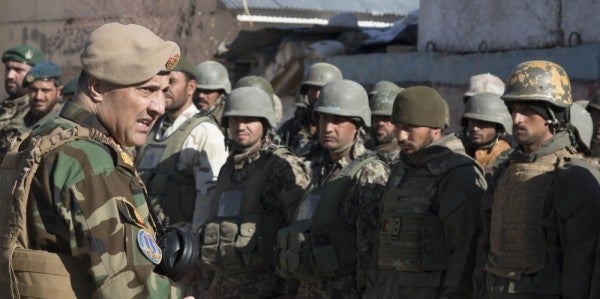Most Afghan troops and police are ‘a hopeless nightmare and a disaster,’ special inspector general tells Congress
'The Afghan military – and particularly the Afghan police – has been a hopeless nightmare and a disaster. And part of it is because we rotate units through that aren't trained to do the work.'

The U.S.-led effort to train Afghan troops and police over the past two decades has been an abysmal failure for the most part, said John Sopko, the exceptionally frank special inspector general for reconstruction in Afghanistan.
“The Afghan military – and particularly the Afghan police – has been a hopeless nightmare and a disaster,” Sopko told lawmakers on Wednesday. “And part of it is because we rotate units through that aren't trained to do the work, and they're gone in six-to-nine months. I don't blame the military, but you can't bring in a Black Hawk pilot to train an Afghan policeman on how to do police work. And that's what we were doing — we're still doing.”
Sopko testified before the House Foreign Affairs Committee on Wednesday following the Washington Post's publication of the “Afghanistan Papers,” a series of interviews that SIGAR has conducted in which top U.S. officials have privately conceded that the war in Afghanistan has provided few — if any — tangible successes.
Many lawmakers were absent from the hearing as the big news of the day was the House of Representatives voting sending articles of impeachment to the Senate. Once again, the war in Afghanistan was drowned out by domestic politics and an American public with a short attention span.
While U.S. service members are trying to train Afghan troops and police to fight the Taliban, ISIS, and other terrorist groups, the Afghan security forces are undermined by extensive corruption that limits their effectiveness, Sopko said.
It has only been in the past year that Afghanistan has retired old Soviet-trained senior officers in order to allow a new generation of leaders to take over, so it is too soon to say whether that move has shown any success, he added.
“The problem is that below that corps level, below that officer level, you have a lot of corruption, a lot of incompetence and it's seriously hurting the Afghan military,” Sopko. “The biggest problem is not casualties; it's desertion – people disappearing. Or, it's people who never existed who we're paying their salaries.”
Many Afghan troops are not being paid or fed, he said.
“They have to buy their own food from their officers, who steal it from them,” Sopko said.
But not all of the news about training Afghan security forces has been bad, Sopko pointed out on Wednesday. Two success stories have been Afghanistan's special operations forces and the Afghan air force.
In both cases, U.S. troops have worked with their Afghan counterparts for longer than the standard rotation. Special Forces soldiers work with the same Afghan units over repeated deployments and the Air Force has a cadre of airmen that work with Afghan aviators for up to four years.
“You don't want to send somebody over there for 18 years,” Sopko said. “That's impossible. My dad was drafted for World War II and he was there for the length of the war, however long it lasted. That's a little different. But there's a way to do that so you don't lose that connectivity; you don't lose that experience; you don't lose that connection with this Afghan unit; and you work together; and that Afghan feels closer to you, the American advisor, than he does to the Taliban.”
